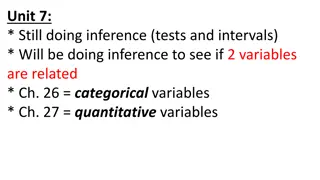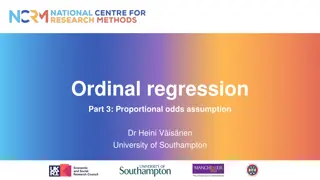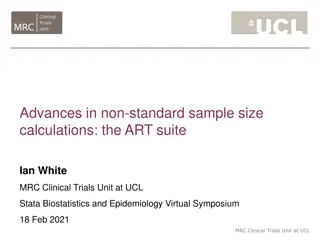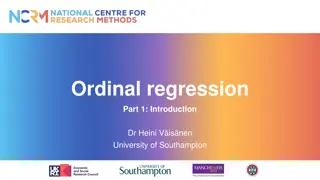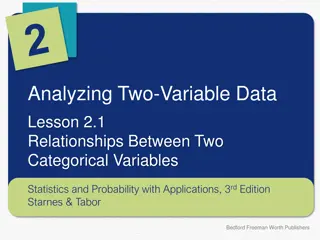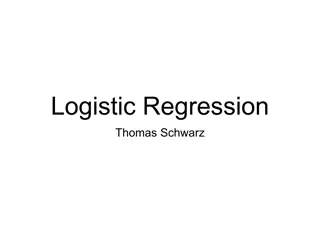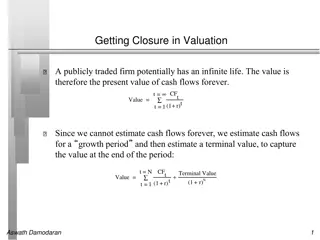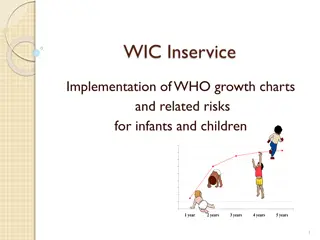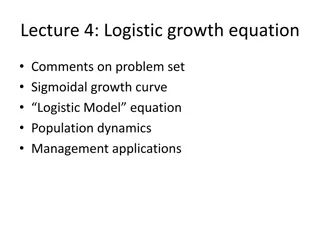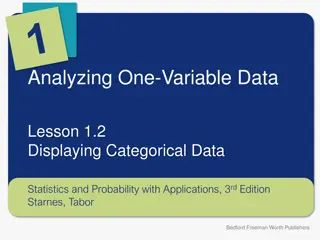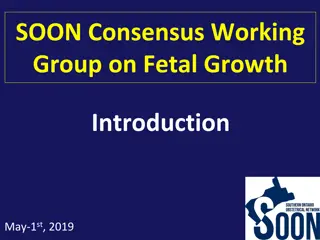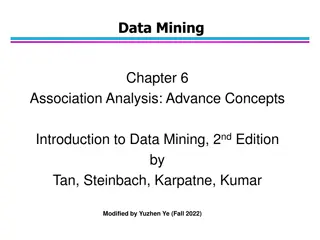Semi-Supervised Credit Card Fraud Detection via Attribute-Driven Graph Representation
Explore a novel approach for detecting credit card fraud using a semi-supervised attribute-driven graph representation. The technique leverages temporal aggregation and attention layers to automatically unify heterogeneous categorical attributes and detect fraudulent transactions without label leaka
1 views • 23 slides
Understanding Data Types and Summary Statistics in Exploratory Data Analysis
Data types, including discrete numerical, continuous numerical, ordinal, and nominal, are essential in exploratory data analysis. Variables can be categorized based on their nature, such as numerical variables (interval vs. ratio) and categorical data summaries. Learn about USGS flow measurements, n
4 views • 48 slides
Growth Strategies for Business Success
Explore various growth and survival strategies for businesses, including vertical and horizontal growth, overcoming scarcity of funds, factors affecting organizational growth, and advantages and limitations of business expansion. Learn about different growth strategies such as intensive growth, dive
2 views • 35 slides
Understanding Deontology and Distributive Justice in Ethics
Deontology, originating from the Greek words for duty and study of, focuses on morally required, forbidden, or permitted choices. It emphasizes obedience to duty and opposes utilitarianism, prioritizing what is morally right over the overall good. Unlike virtue theories, deontology assesses moral ob
2 views • 32 slides
School Parent Involvement Budgeting Guidelines 2015-2016
Providing guidance to schools on developing categorical budgets and aligning Title I parent involvement funds with program guidelines. Research shows parental involvement improves student outcomes. LAUSD's core beliefs, goals, and district goals emphasize student achievement, safety, and community e
6 views • 21 slides
Understanding Inference Tests and Chi-Square Analysis
The content discusses the application of inference tests to determine if two variables are related, focusing on categorical and quantitative variables. It provides examples related to testing fairness of a die and comparing observed and expected distributions of Skittles colors. Additionally, it cov
1 views • 16 slides
Overview of Categorical Aid in Education Finance
Categorical aid in education funding serves specific purposes such as special education, transportation, and mental health. It operates outside revenue limits and often comes in fixed or prorated amounts. The process involves targeted grants and reimbursement formulas. Special Education & School-Age
1 views • 36 slides
Identifying Student Percentage Reporting SY 2021 - 2022
Identified Student Percentage Reporting (ISP) is essential for districts to report the number of students identified through direct certification and categorical lists in eSchool. This report must be submitted by April 15, 2022, to comply with federal regulations. Understanding how ISP is calculated
1 views • 12 slides
Understanding Proportional Odds Assumption in Ordinal Regression
Exploring the proportional odds assumption in ordinal regression, this article discusses testing methods, like the parallel lines test, comparing multinomial and ordinal logistic regression models, and when to use each approach. It explains how violating the assumption may lead to using the multinom
0 views • 13 slides
Advances in Sample Size Calculations for Clinical Trials: The ART Suite
This presentation discusses the importance of sample size calculations in research studies, especially in the context of clinical trials. It covers tools like ART and Power in Stata for binary and categorical outcomes, emphasizing the need to determine the right sample size to ensure research questi
3 views • 35 slides
Understanding Chi-Square Test in Statistics
Chi-square test is a non-parametric test used to measure the association between categorical variables. It can assess goodness of fit and test for independence between observed and expected frequencies. No specific assumptions are needed for the variables in this test. Chi-square frequency tables he
2 views • 10 slides
Graduate Level Categorical Data Analysis Course
This PowerPoint presentation offers a comprehensive guide to teaching a first-semester course in Categorical Data Analysis at the graduate level. Covering key sections from Alan Agresti's textbook, the presentation includes real-data examples, software guidance, and solutions to exercises. The instr
1 views • 5 slides
Understanding Ordinal Regression in Data Analysis
Introduction to ordinal regression, a powerful tool for analyzing categorical variables with natural ordering. Explore cumulative odds, probabilities, and the proportional odds model. Learn about estimating equations, intercepts, and slopes in ordinal regression models. Discover how higher values of
1 views • 15 slides
Analysis of Indian Economic Growth: Perspectives and Turnaround
Dr. Shailesh Kumar, Assistant Professor at Bharati College, University of Delhi, delves into the Indian growth experience from two perspectives - aggregate growth over time and variations across states. The turnaround in growth measures post-1980, including GDP per capita and productivity, has been
1 views • 12 slides
Understanding Latent Transition Analysis: A Comprehensive Overview
Latent Transition Analysis (LTA) is a statistical method that identifies unobservable groups within a population using observed variables, aiding in profiling individuals and tracking transitions over time. It is particularly useful for modeling categorical constructs, informing prevention and inter
0 views • 23 slides
Understanding Categorical and Numerical Data in Mathematics
Explore the distinction between categorical and numerical data in math. Learn how mathematicians categorize and analyze data, sorting cards into different categories to understand similarities and differences. Develop perseverance skills by determining survey question types and defining data types w
0 views • 9 slides
Analyzing Relationships Between Categorical Variables in Statistics
Explore relationships between two categorical variables in statistics, distinguishing between explanatory and response variables. Learn to create segmented bar charts and identify associations. Understand the importance of identifying explanatory variables in analyzing data relationships. Improve yo
0 views • 15 slides
Strategic Management in Tourism: Current Trends and Future Perspectives
This content delves into the strategic management aspects of tourism, focusing on projected growth, determinants of tourism growth, challenges in lesser developed countries, and policies for destination competitiveness. It discusses the projected increase in international tourist arrivals, drivers o
0 views • 9 slides
Understanding Exponential Growth Functions Based on Gordon's Book
This presentation delves into exponential growth functions using real-world examples such as the population growth of Niger. It covers topics such as algebra with exponents, finding formulas for growth models, terminology, and graphing population growth over time. The content explores how exponentia
1 views • 21 slides
Parallel Chi-square Test for Feature Selection in Categorical Data
The chi-square test is a popular method for feature selection in categorical data with classification labels. By calculating chi-square values in parallel for all features simultaneously, this approach provides a more efficient solution compared to serial computation. The process involves creating c
1 views • 4 slides
Visualizing Categorical Data in Data Analysis
Explore methods for displaying and describing categorical data effectively, from frequency tables to bar and pie charts. Understand the importance of visual representation in drawing insights and making comparisons. Dive into examples using football team data and Titanic survivors. Learn to identify
1 views • 20 slides
Analyzing Categorical Growth and Values Table in Accountability Panel
Analyze the growth and values table in the accountability panel through categorical growth and status improvement tables. The subgroups' significance of categorical status changes is assessed using a rating system. Temporary cut scores for sub-categories have been employed for evaluation, with a foc
0 views • 51 slides
Understanding Chi-Square Tests in Statistics
Chi-square tests in statistics are used to examine the relationship between categorical variables or test claims about categorical variable distributions in populations. The Chi-square test statistic measures the discrepancy between observed and expected counts, with the Chi-square distribution help
0 views • 16 slides
Understanding Binary Outcome Prediction Models in Data Science
Categorical data outcomes often involve binary decisions, such as re-election of a president or customer satisfaction. Prediction models like logistic regression and Bayes classifier are used to make accurate predictions based on categorical and numerical features. Regression models, both discrimina
0 views • 67 slides
Understanding Terminal Value in Valuation
Valuation of publicly traded firms with potentially infinite lives involves estimating cash flows for a growth period and a terminal value to capture value at the end. The stable growth rate, which cannot exceed the economy's growth rate, plays a crucial role in determining the present value of futu
0 views • 8 slides
Understanding Categorical Data Analysis for Proportion Estimation
In the realm of categorical data analysis, estimating proportions is crucial for understanding population characteristics. This involves sampling, calculating sample proportions, standard errors, and constructing confidence intervals. Through examples like studying the effects of treatments on medic
0 views • 72 slides
Categorical Data Analysis in Population Studies
Inference methods for estimating proportions in a population are essential in categorical data analysis. This includes techniques for single proportions, confidence intervals, sample size determination, and Wilson-Agresti-Coull method for small sample sizes. Illustrated with examples and visuals, th
0 views • 80 slides
Understanding Oregon's Growth Model for Education Accountability
Oregon's Growth Model for education accountability uses a system that compares student growth to academic peers in the state. School growth ratings are determined based on levels of growth in reading and math, with a focus on tracking student progress over time. By comparing growth percentiles and s
0 views • 25 slides
Implementation of WHO Growth Charts for Infants and Children
Growth charts are essential for assessing children's growth, with WHO setting international standards since 2006. The discussion includes interpreting growth charts, the history of growth references, and the difference between reference and standard growth. It compares CDC's U.S. growth reference to
0 views • 30 slides
Understanding Logistic Growth in Population Dynamics
Explore the logistic growth equation and its applications in modeling population dynamics. Dive into the concept of sigmoidal growth curves and the logistic model, which reflects population growth with limits. Learn how to calculate population change using the logistic growth equation and understand
0 views • 26 slides
Health Care Cost Trends in Oregon: 2013-2019 Report Insights
The report delves into the cost growth trends in health care in Oregon from 2013 to 2019, highlighting the establishment of the Sustainable Health Care Cost Growth Target Program by the state legislature. It monitors and reports on factors driving health care cost increases, with a focus on per-pers
0 views • 35 slides
Understanding Categorical Data Displays and Analysis
Visual displays of categorical data such as bar graphs, pie charts, and frequency distributions help organize and interpret large amounts of data effectively. Different types of graphs serve specific purposes, like comparing categories visually and identifying modes easily. This overview covers the
0 views • 10 slides
Understanding BCG Matrix: Market Growth and Relative Market Share
BCG Matrix, developed by Bruce Henderson of the Boston Consulting Group, categorizes business units into Question Marks, Stars, Cash Cows, and Dogs based on market growth and relative market share. Market share and market growth are crucial factors in determining a company's position in the market.
0 views • 31 slides
Understanding Venn Diagrams and Categorical Syllogisms
Venn diagrams, introduced by John Venn, visually represent relationships between different classes. Shading in diagrams signifies empty sets or no overlap between classes. Different types of categorical statements such as universal and particular are illustrated using examples. Explore how Venn diag
0 views • 30 slides
Understanding Categorical Syllogism in Logic: A Comprehensive Overview
Categorical syllogism, a form of inference with two premises and a conclusion, is a fundamental concept in logic. This type of deductive argument consists of three categorical propositions - universal affirmative, universal negative, particular affirmative, and particular negative. Terms such as maj
0 views • 16 slides
Understanding Bacterial Growth and Nutritional Requirements
Bacterial growth involves processes like binary fission, exponential phase, and stationary phase. Factors influencing growth include nutrient availability, oxygen levels, and toxic waste accumulation. Lag phase precedes exponential growth, where cells prepare for division. Stationary phase occurs wh
0 views • 11 slides
Displaying Categorical Data: Bar and Pie Charts
This lesson explores the visual representation of categorical data using bar and pie charts. Learn how to create and interpret these graphs to display variable distributions clearly. Understand deceptive graph practices and master the skills to make accurate and informative data displays in Statisti
0 views • 16 slides
Neonatal Nutrition: Growth, Nutritional Support, and Management Phases
Neonatal nutrition, specifically focusing on growth faltering and early nutritional support, is crucial for the well-being of premature infants. Understanding growth rates and providing appropriate nutrients are key goals. Target growth rates and reference growth curves are important considerations.
0 views • 28 slides
Standardizing Fetal Growth Assessment for Improved Patient Care
The SOON Consensus Working Group focuses on conducting large-scale research, quality improvement, and standardizing care in fetal growth assessment. With a mission to address the wide variation among centers, the group aims to enhance patient care by standardizing the measurement and interpretation
0 views • 10 slides
Advanced Concepts in Association Analysis: Handling Categorical Attributes
Explore advanced concepts in association analysis, focusing on the handling of categorical attributes. Learn how to apply association analysis to non-asymmetric binary variables, including examples and potential solutions for skewed attribute value distributions. Discover techniques for managing att
0 views • 48 slides





